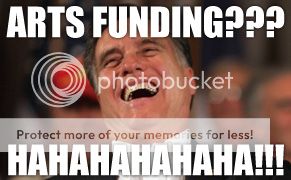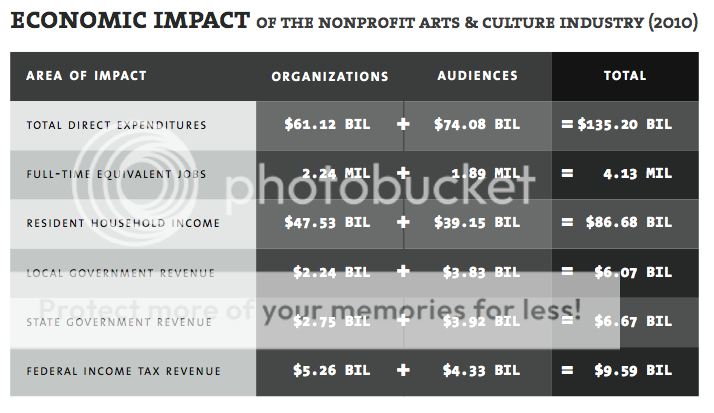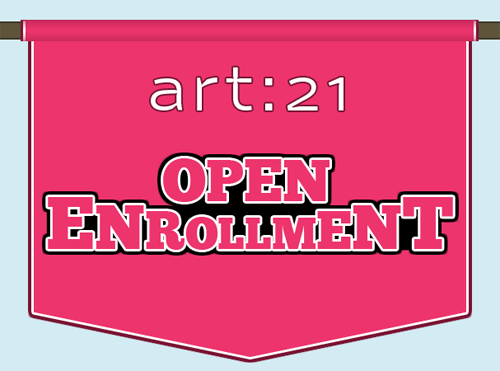Like so many other second years, I had the proverbial graduate school meltdown a few weeks ago. With mounting debt, and the nagging thought of “was this really the right thing to do?”, I turned on my television, like any other good American does, to watch the first of the 2012 Presidential debates. When Mitt Romney proudly said he would cut federal funding for PBS, the subtext read, he’d cut federal funding for the National Endowment for the Arts as well.

This isn’t terribly shocking because the issue is not a new thing, but it being an election year, federally-funded art programs are dragged into the spotlight. Recently, Ezra Klein at The Washington Post pointed out just how much money would be saved by cutting these organizations: “In fiscal year 2012, the federal government spent… $146 million on the National Endowment for the Arts and Humanities. Getting rid of all these subsidies [including PBS, Amtrak] would have saved the government about $2 billion this year — chump change relative to the scale of cuts that Romney wants.” So not much, but enough so that Romney (and many of the other Republicans before him) can appease conservatives. The arts are the easy target – the scapegoat.

Jillian Steinhauer (Hyperallergic) brings up a good question about the NEA and arts funding. She says “there’s a larger conversation here, about the role of the federal government in arts funding. Should we expect it — or at this point, after decades of struggling to hold on to just a little piece of the pie, should we let it go?”
So should we (as artists, as practitioners, as supporters) keep up the good fight, or let federal support die out? Everything in my educational training tells me fight is the only option. It’s kind of like a self-preservation piece – a rally cry for future jobs in arts nonprofits (if we lose the NEA, does that mean I won’t have a job post-graduation? This is a question that often cycles through my mind). In class recently, I read through the most current Arts & Economic Prosperity report put forth by the Americans for the Arts organization. In short, it is an impact study that assessed the nonprofit arts and cultural industry’s impact on the US economy. They found that the arts actually generated $135.2 billion in economic activity and an additional $74.1 billion in event-related expenditure. The arts supported nearly 4 million full-time jobs in 2010, and generated $22.3 billion in local, state and federal revenue annually.

While the NEA is not directly responsible for this type of economic stimulation, the small amount of money they allocate to artists and organizations acts as leverage for all the other money they raise on a yearly basis. It’s a feeder program for private donors and endowments. It is an honest worry that if you cut the NEA, organizations run the risk of relying only on private support, and in some cases that a) isn’t enough, b) private investors want to see public support. A Catch-22. Additionally, another conversation for another day, but forget all you artists out there who want grants from organizations supported by the NEA. Forget our creative economy.
Despite the proven economic benefit of the arts, the other side of the story, the intangible benefits of the arts, are almost impossible to objectively measure and produce in a scientific form. I honestly believe (and others do, too) this is the reason fighting for arts funding always feels like an uphill battle. We, as people in the field (and in the know) understand the intrinsic benefits the arts provide, but when organizations struggle to articulate the abstract value and impact the arts provide, the argument falls flat. The other side of this NEA debate is that maybe we should just let the government do what they want, and save ourselves some time, sanity, and effort. Organizations would still have to prove their worth to generate the funds needed to drive their mission, but I think we would see many smaller organizations (especially those in rural America) founder and close their doors.
It is an interesting caveat, and I can’t help but feel that this NEA debate is just a smaller piece of a larger issue–and that issue is that the arts, in all their economic, educational, societal, and innovative glory–do not do a good enough job of proving their own worth. As practitioners of the right now (and of the future), it’s our job to work collectively to answer what I think to be the real question underneath this all: what is the value of arts to this country?
What does it look like?




